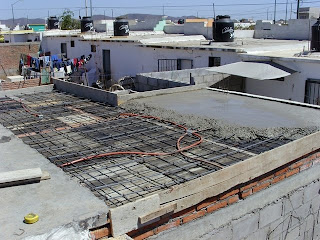If I were to take you to Paco's father's barrio (neighborhood) you would undoubtedly, as an American, see it as impoverished - without the neatly trimmed green grass and well kept homes of even a middle-class residential area in the U.S.
If I were then to take you to Pacito's casita - where we are adding a second bedroom - you'd be correct in observing that it was an even poorer neighborhood.
But just a few blocks from Pacito's little house is true poverty by anyone's standards. They call it an "invasion". We'd call it's residents "squatters", and might call the barrio "Hooverville", a name that dates back to the Great Depression and it's beginnings under the administration of President Herbert Hoover.
Here are a few photos I took the other day as we drove past. The homes are made of whatever scraps of lumber and canvas or plastic can be scavanged. The photos don't begin to tell the tale. There are hundreds of homes and thousands of Mexican families living on this piece of land that belongs to someone other than they... but someone who doesn't seem to mind their presence.

Forty years ago Paco Senior's home was in an "invasion" and his home was made of plywood. In time the squatters were able to buy their little plot, usually 7 meters by 20 meters in size, although the sizes vary and it is obvious from the odd angles and varying widths of the houses that the final dimensions followed the original lines measured with paces and lines drawn in the dirt.
In time Paco's wooden shack was replaced with brick and cement and expanded the same way we're currently adding a room to Pacito's home. Though his casita is part of a planned subdivions and all the houses are tediously the same. That sameness is disappearing as individual homeowners are modifying their casitas, sometimes extending them to the sidewalk, adding storefronts (one neighbor has opened a tire store complete with service garage large enough for one customer).

In time this may become a neighborhood with brick and concrete homes and a paved street, if the future follows the form of the past. But for now it is a poverty stricken place served by one water well, and a single electric wire strung from a nearby home.

 Paco and his brother Ricardo are installin the "magera" (plastic hose) for electric wiring for lights, all of which will be securely buried in the concrete roof. Supported by a gridwork of metal rebar.
Paco and his brother Ricardo are installin the "magera" (plastic hose) for electric wiring for lights, all of which will be securely buried in the concrete roof. Supported by a gridwork of metal rebar. The roof is partially filled with cement.
The roof is partially filled with cement.















